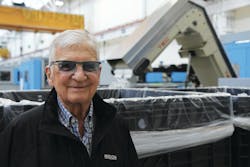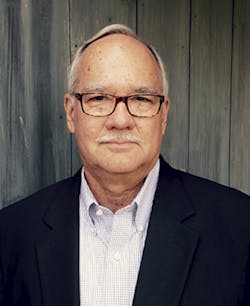Most important factor in business plan? Customers
A former colleague of mine once had a conversation with Robert Schad, then owner of Husky Injection Molding Systems Ltd., about starting a molding business. My friend launched into a narrative about buying a Master Unit Die (MUD) system so he could perform mold changes himself, then buying a small injection molding machine that he could run himself and specialize in small parts, then …
"No," Schad interrupted. First you need a customer. That's where you start.
I was reminded of that anecdote recently while touring Schad's massive, new 155,000-square-foot, $45 million manufacturing facility in Vaughan, Ontario, where he will build molding machines under his Athena Automation Ltd. brand. Presumably, Schad believes he will have a lot of customers.
The new facility, alongside his existing plant, is purpose-built for manufacturing molding machines. The inside of the building changes every week as more manufacturing equipment is installed, but when I visited it was clear how parts will flow into the building and completed, tested machines will flow out. My impression was that every detail had been considered and checked and approved. Schad has included provisions for future expansion.
Shipments of new molding machines from the facility will start soon — probably in the second quarter — even as the North American market has plateaued after a strong growth spurt. But Athena officials are focused on the long term.
"We are optimistic," says Jim Overbeeke, senior VP of sales at Athena. "We have some orders, and some are for entire systems that require integration. We are also in the process of building a strong service organization."
Athena plans to build molding machines in the new plant on a just-in-time basis. There will not be a warehouse full of machines ready to ship.
"Only pre-engineered options on a platform built for customization make just-in-time manufacturing possible, at the same time providing a superior product," Overbeeke says. Athena's list of more than 50 pre-engineered options can equip a molding machine with a stack mold carrier, rotary table, preform package or many other features.
"Integrating all these options better and faster is a big deal," Overbeeke says. "It gives a processor advantages that other machinery makers don't offer."
The engineering brilliance Schad demonstrated in building Husky into a worldwide player in plastics processing equipment is behind everything Athena is manufacturing, but Overbeeke says the company has additional engineering prowess that is not so noticeable to outsiders.
"We have hired a mixture of engineers, some with industry experience and others who are younger engineering graduates, and all [are] willing to try new ideas," Overbeeke says. "They have been trying a lot of things. Some have worked and some have not, but their willingness to do things in a different way is critical."
Schad's influence in pushing his engineers to take risks to figure out better ways to solve problems without fear of failure is evident. He spends a good portion of every workday with the engineers. "He drives solutions," Overbeeke says.
The Athena injection molding machines available in 150 to 300 metric tons of clamping force are designed to be simple and compact. All the machines incorporate servo ball screw-and-pump technology, plus reciprocating-screw or two-stage injection units with screw diameters ranging from 30mm to 120mm. Energy consumption is reduced by regenerating kinetic energy from braking into the general power supply system.
Athena already has 11 of its molding machines at mold making facilities, where they are primarily used for testing molds. Feedback from those mold makers — along with their customers who see Athena machines when they visit to watch their new molds being tested — has sparked innovation and new ideas for customization.
Schad, a German immigrant, started a machine shop in 1953 that evolved into Husky. Husky was sold to Onex Corp., a Canadian conglomerate, in 2007 for $957.6 million. Schad and his wife owned 44 percent of Husky's shares.
Schad started Athena Automation in 2008. Will he be able to create another giant machinery company?
No one is betting against him. The company starts full-scale production at the new facility this year with a growing staff and no debt. Industry veterans say his idea for efficient, highly customizable injection molding machinery will be a hit.
Schad is 87 years old. He has not talked about retiring, or even slowing down. He also does not give outsiders specifics on a succession plan for Athena except to say that it is a family-owned company with employee shareholders. Schad's son, a recent University of Virginia graduate with an engineering degree and a minor in business, is now employed at Athena.
Put me squarely in the group that believes Athena Automation will succeed. It is a company with a pedigree of engineering excellence, small enough to quickly react to market changes, yet big enough to operate worldwide.
Ron Shinn, editor
About the Author
Ron Shinn
Editor
Editor Ron Shinn is a co-founder of Plastics Machinery & Manufacturing and has been covering the plastics industry for more than 35 years. He leads the editorial team, directs coverage and sets the editorial calendar. He also writes features, including the Talking Points column and On the Factory Floor, and covers recycling and sustainability for PMM and Plastics Recycling.


